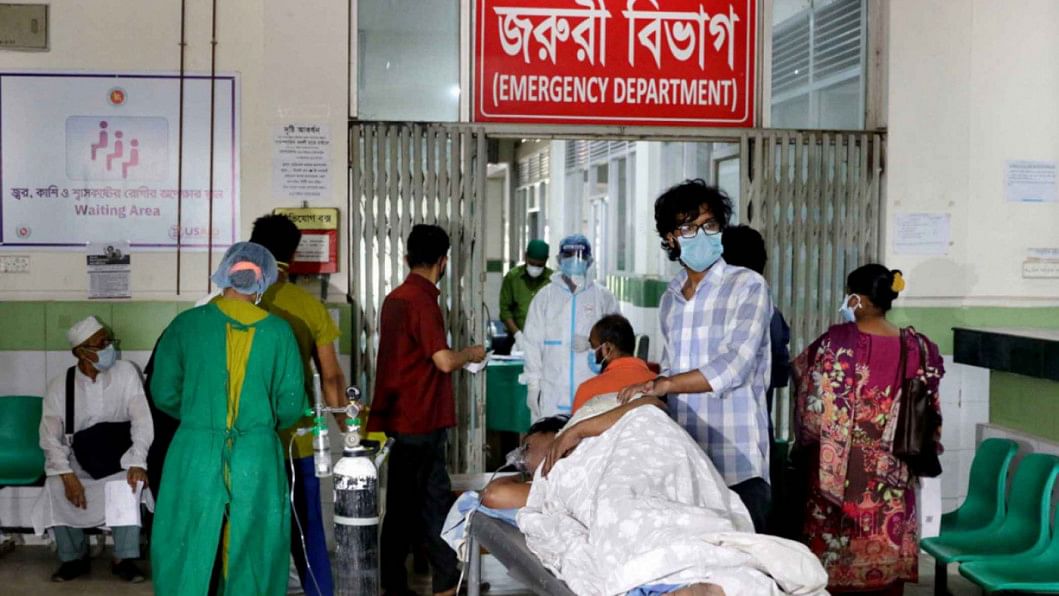Who benefits from the raids at healthcare facilities?

Every year, we see raids taking place at hospitals, clinics, diagnostic centres, and other healthcare facilities across Bangladesh. This year, too, the government ran a countrywide campaign against illegal healthcare facilities, shutting down more than 1,600 such institutions. No one can say how many unregistered hospitals, clinics, diagnostic centres and blood banks exist in the country. According to some estimates, the number of illegal hospitals is two or three times that of the legal ones.
Healthcare providers cannot operate in secret, so how is it that so many unauthorised institutions have been able to run their activities? The more important question is: why are more and more people going to private institutions for healthcare?
Over the years, budget allocations for the health sector as a proportion of the GDP have steadily declined in Bangladesh, which is now below one percent. Bangladesh is ranked the lowest in South Asia in terms of per capita government expenditure on healthcare. According to a report by the World Health Organization (WHO), 49 percent of the country's population do not receive quality healthcare services. In 2020, the health sector was running with less than 10 doctors, nurses, and midwives for every 10,000 people. And the skills of the majority of doctors, nurses, and midwives in the country do not meet the standards set by WHO.
Most of the hospitals that have been declared illegal by the government were occupied by doctors who are registered with Bangladesh Medical and Dental Council (BMDC). Assistants at operation theatres (OTs) perform minor to major surgeries. There are not enough nurses; in many places, cleaners work as nurses. Smoke from the kitchen enters OTs at times, and used equipment is used to treat patients. Hospitals have been found to accommodate patients far beyond their capacity. Quality of lab work is substandard, and not all facilities are available to run tests. In many places, the environment is not good for patients at all.
The raids that have shut down numerous unregistered hospitals, clinics, and diagnostic centres frequently seem to be for show now – one day they are closed, and the next day they are up and running again. The health administration has consistently failed to stop the massive level of corruption and irregularities that go on in these healthcare facilities, as an overwhelming majority of owners of illegal hospitals are politically influential.
Illegal and unlicensed hospitals are mainly broker-dependent. In other words, agents of these hospitals roam around in the government hospitals, which are overburdened and have limited resources, and lure patients and their families – especially those who come from rural areas to seek medical treatment – to these private practices. In these hospitals, patients are often subjected to maltreatment, and the expenses are also very high. Many patients and their families lose everything to pay for their medical bills. These brokers roam around openly and are known. Yet, no action is taken against them.
Owners of illegal clinics and diagnostic centres are also quite well-connected – both financially and politically. Therefore, oftentimes, if a patient dies due to improper treatment in any of these clinics, not much is said and done about it. That is why the raids to identify and fine illegal practices do not bring any significant change in the country's healthcare system. Unless the core problems are addressed, they never will.
Healthcare has turned into a lucrative business for many people in the country, who do not deviate from their mission to make profits even in the most extreme situations. We have all seen how some people made hundreds of thousands of taka just by selling masks and testing kits in the early days of Covid-19 pandemic, when there was a severe crisis. Measly budgetary allocations for the health sector have not helped the situation either. Lack of priority on the government's part to make healthcare accessible to everyone is leaving a major segment of our population vulnerable to these profiteers. The only way to save our health sector from them and make quality healthcare accessible and affordable for the general mass is to bring the entire healthcare system of the country under the public sector. Regulations have to be in place and implemented in order bring semblance of accountability to the healthcare sector. Conducting some raids against private hospitals, clinics, and diagnostic centres from time to time will not make much difference.
Dr Rakib Al Hasan is a physician, author, activist, and youth leader. His Twitter handle is @rakibalhasan_bd

 For all latest news, follow The Daily Star's Google News channel.
For all latest news, follow The Daily Star's Google News channel. 








Comments